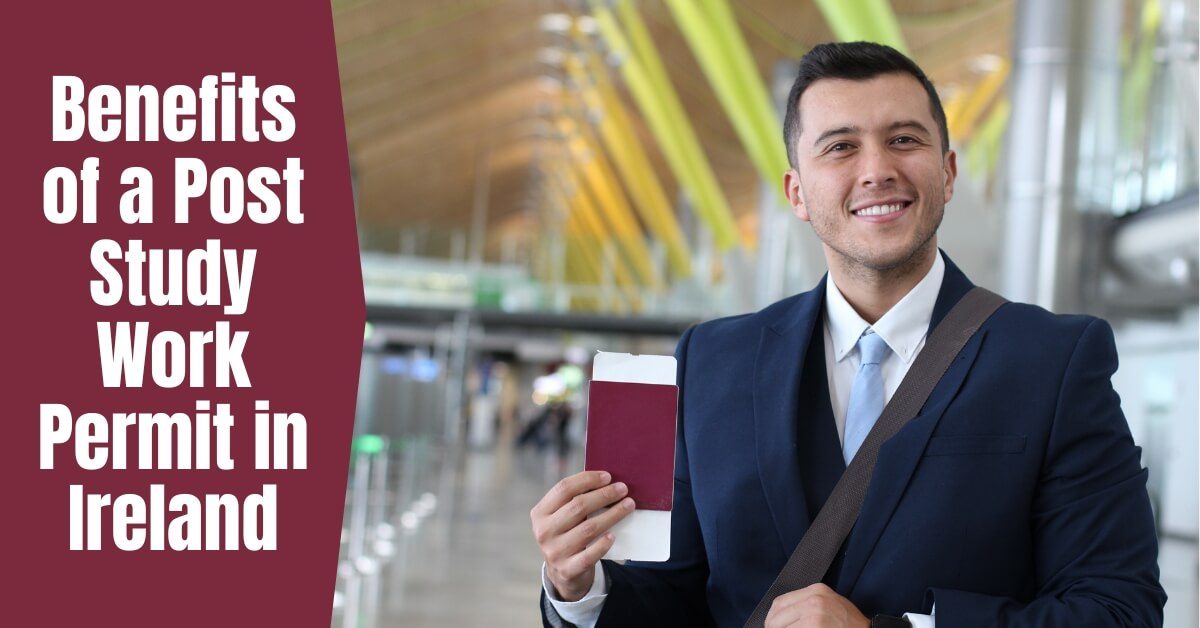Ever thought about how a Post Study Work Permit in Ireland could kickstart your career? This permit is a gateway for international students to start their professional journey in Ireland. Known for its lively job market and friendly culture, Ireland is the perfect place to begin.
In this article, we’ll cover the key eligibility criteria for the work permit in Ireland. You’ll also learn about the benefits and how to apply. This will help turn your academic dreams into a real career.
What is the Post Study Work Permit in Ireland?
The Post Study Work Permit in Ireland is for non-EU/EEA graduates from Irish universities. It lets them stay in Ireland for a while after finishing their studies. This is a great chance to get work experience in their field, helping their career.
This permit can last up to two years, based on the degree level. It helps students move from studying to working easily. It boosts their skills and makes getting a long-term work visa easier. This is important for those wanting to live in Ireland permanently.
Eligibility Criteria for Post Study Work Permit in Ireland
Ireland offers international graduates a unique opportunity to stay and gain valuable work experience after completing their studies. The country’s immigration policy is structured to retain skilled talent and support economic growth.
To benefit from this opportunity, students must meet a set of eligibility requirements defined by Irish authorities. Below are the essential criteria every graduate must know before applying.
1. Degree Must Be Awarded by an Irish Institution
To qualify, you need to have completed your studies at a recognized Irish higher education institution. The qualification must be Level 7 or above, as defined by the National Framework of Qualifications (NFQ). This includes bachelor’s degrees, higher diplomas, master’s, and PhDs offered by approved Irish colleges and universities.
2. Must Hold Valid Stamp 2 Immigration Permission
At the time of applying, your immigration status must be active under Stamp 2 — this is the student visa permission that allows international students to study in Ireland. If your Stamp 2 permission has expired or is no longer valid, you will not be eligible to apply.
3. Application Must Be Made Within 6 Months of Final Results
You are only allowed to apply within six months of receiving your final exam results. This means once your results are published by your institution, the countdown begins, not from the graduation ceremony.
4. Total Stay in Ireland Cannot Exceed 7 Years
For non-EU/EEA students, there is a seven-year cap on total residency during the student period and after. If your total duration in Ireland as a student (under Stamp 2) and during the graduate phase exceeds 7 years, your application may be rejected.
By meeting these requirements, the government aims to keep skilled graduates in Ireland. This helps make the job market even more vibrant.
| Criteria | Details |
| Degree Completion | Graduate from an Irish institution with a relevant Level 7 qualification. |
| Valid Student Status | Must hold a valid Stamp 2 immigration permission. |
| Application Timeline | Apply within six months of receiving final results. |
| Residency Limits | Must not exceed the seven-year limit for non-EU students. |
Benefits of a Post Study Work Permit in Ireland

The Post Study Work Permit in Ireland has many benefits. It’s a great choice for recent graduates. One big plus is the chance to get work experience.
Graduates can learn a lot in fields like tech, finance, and healthcare. This experience is crucial for finding their way in the job market. It helps them understand what employers want.
Working in Ireland also means lots of chances to network. Meeting people from different industries can boost your job prospects. It’s not just in Ireland but worldwide too.
Building connections is key to finding new jobs and working with others. It opens doors to exciting opportunities in a global market.
Another big plus is the chance to stay in Ireland long-term. Completing your work experience can lead to long-term work permits or even permanent residency. This makes it easier to settle down and grow your career in Ireland.
Graduates can also explore different parts of Ireland while working. Trying new places and cultures helps them grow. It makes them more appealing to employers.
In summary, the post-study work visa offers many benefits. It helps graduates get work experience, network, and even stay in Ireland long-term. It’s a great way to start a career and make a new life in Ireland. If you’re still studying and wondering about part-time jobs, you may also want to learn Can I Work and Study in Ireland — another pathway to gain early work experience.
How to Apply for a Post Study Work Permit
Applying for a post-study work permit in Ireland has a few key steps. You need to have the right documents. These include proof of your degree, a valid passport, and proof you can support yourself financially.
Then, you must apply online through the Employment Permits Online System (EPOS). You can apply yourself or have your employer help. This choice depends on your preference and situation.
Remember, there’s a fee for applying. It usually takes about 13 weeks to get approved. After approval, you’ll get a Stamp 1G. This lets you work full-time in Ireland for up to 24 months.
Knowing the Ireland work permit requirements helps make the application process easier. It makes your transition into the workforce smoother.
Can You Work Full-Time with a Stamp 1G?
Yes, graduates with a Stamp 1G can work full-time in Ireland for up to two years. They have the same rights as Irish citizens. This means they can work in many sectors without limits.
This is great for graduates who want to get work experience. It helps them improve their career chances.
Stamp 1G holders can find many jobs. This makes it easier for them to start working. The flexibility of this stamp helps them grow personally and professionally.
It’s important for those who want to stay in Ireland long-term. The rights of Stamp 1G holders help them on their journey.
Conclusion
The Post Study Work Permit Ireland is a great chance for international graduates. It lets them move from being students to workers. They can get practical experience in their field for up to two years.
Ireland’s economy is growing fast. This makes the work permit even more valuable. It helps both the individual’s career and the labor market.
Many graduates find good jobs after getting this permit. They can explore long-term career paths. Ireland offers a wide range of job opportunities.
Frequently Asked Questions
Can I stay in Ireland after graduation without a job offer?
Yes, you can stay in Ireland after graduation without a job offer. The Post Study Work Permit lets you explore different jobs. This increases your chances of finding a good job.
Do I need to renew my Stamp 1G every year?
No, you don’t need to renew your Stamp 1G every year. It’s good for two years. But, you must follow all the rules of your permit while in Ireland.
Can I apply for permanent residency after PSWP in Ireland?
Yes, you can apply for permanent residency after five years of work in Ireland. The Post Study Work Permit helps you get a long-term work permit. This is a step towards residency.
What’s the difference between Stamp 2 and Stamp 1G?
Stamp 2 is for international students studying in Ireland, with limited work rights. Stamp 1G is for graduates of Irish institutions, offering full-time work rights for a set time after graduation.
What are the eligibility criteria for a Post Study Work Permit in Ireland?
To qualify, you must have graduated from a recognized Irish institution with a relevant degree. You need a valid Stamp 2 at the time of application. You must apply within six months of getting your final results. Also, you can’t have worked more than seven years in Ireland as a non-EU student.
How long can I work with a Post Study Work Permit?
With a Post Study Work Permit, you can work for up to two years. This depends on your qualification level.
What are the benefits of the Post Study Work Permit in Ireland?
The benefits include getting valuable work experience in different sectors. You can also build professional networks and have a chance at residency. It offers opportunities for personal and professional growth in Ireland.

